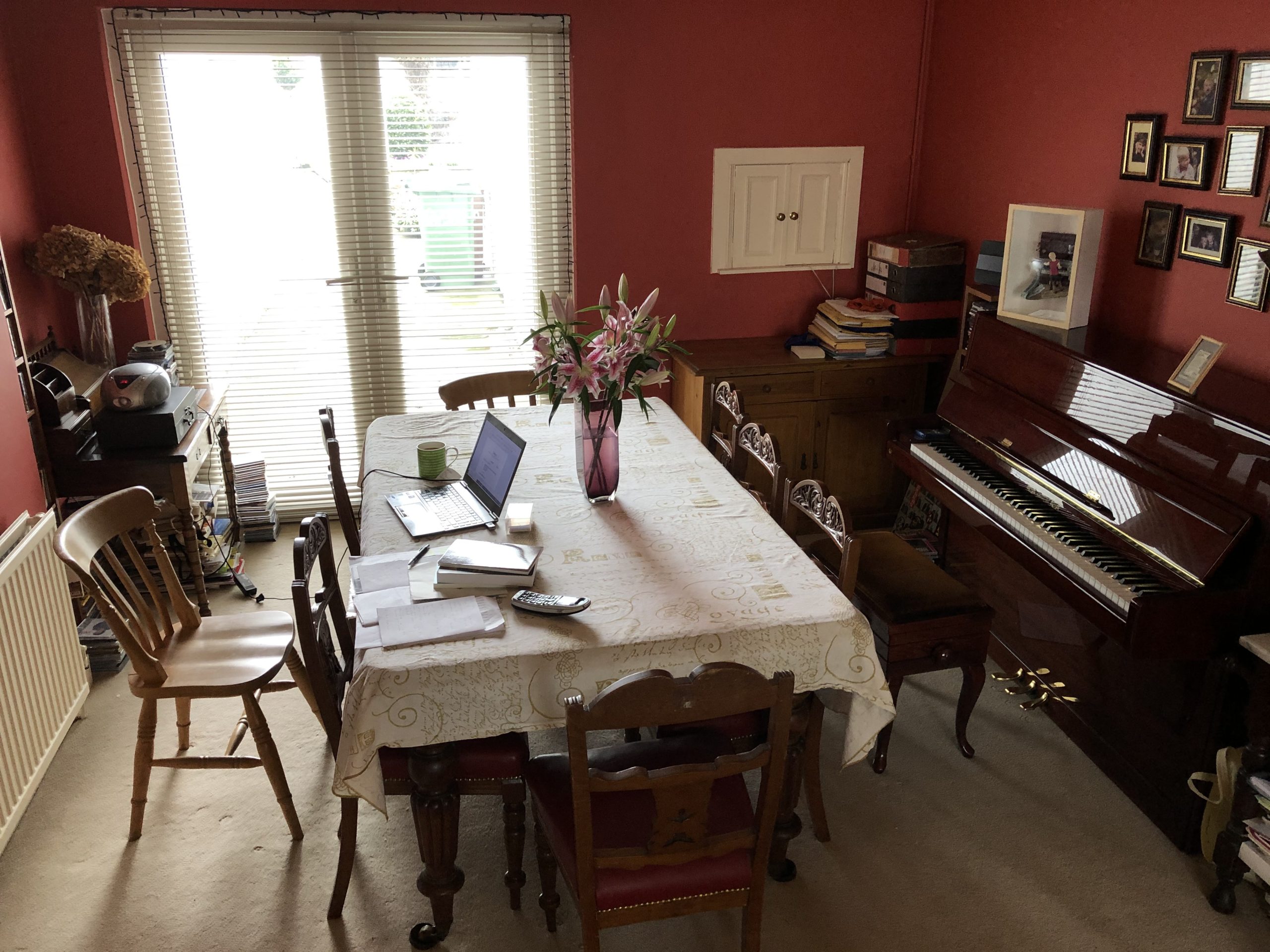Ifor ap Glyn provides the final instalment to Wales Arts Review’s popular Writers’ Rooms series where we took a look into the creative spaces of some of Wales’ top writers. Glyn was appointed Bardd Cenedlaethol Cymru / National Poet of Wales in 2016, a project under the aegis of Literature Wales. He has won the Crown for poetry at the National Eisteddfod twice, and performed at poetry festivals around the world. He has written for television and theatre and has published five collections of poetry. Glyn’s work has been translated into over a dozen languages, from Bakweri to Chinese, and his latest collection of poems, Cuddle Call? (Carreg Gwalch, 2018) was his first with English translation in parallel text.
He has also published a number of historical works, and his personal exploration of the wartime letters of Captain David Jones (1893-1916) ‘Annwyl Fam’: Pererindod drwy’r Rhyfel Mawr (‘Dear Mother’: a pilgrimmage through the Great War) will be published by Carreg Gwalch in 2020. It combines travelogue and social history with a close reading of the letters – together with an honest re-appraisal of the author’s unhealthy obsession with WW1 !

I’ve never had a study as such. Growing up in London, homework was done at a yellow formica table that had been relegated from our kitchen to the bedroom that I shared with my brother. My books were at one end and a Dansette at the other – I’ve always enjoyed music whilst working, and I measured my productivity (or lack of it) in the flipping of vinyl LPs.
Years later, with four children growing up in our home in Caernarfon. I planned a study with my wife in the smallest room in the house – after all, there seemed little else we could do with it. Shelves were built from floor to ceiling along one wall, but with a gap for an antique desk that had been given as a wedding present to my great grandparents. But then my sister-in-law came to live with us for a while, and the desk was moved to accommodate a bed. My sister-in-law left to move into her own house six months later, but the desk is still downstairs in the corner of the living room, buried under CDs.
So – where do I write? To paraphrase Dylan Thomas, mine is a ‘restless craft’ and ‘Writers’ Rooms’ in the plural, is an ironically appropriate title in my case. I write in many rooms; my writing doesn’t have a natural ‘home’, or preferred space. Perhaps it’s because I’ve spent so many years making television programmes. That too is a creative process, but always broken into different phases, and divided between different places; you research here, you film there, you edit in a third place, and so on.
I’m writing this piece on a train – I welcome the enforced focus that brings. Other favoured spots, when I have a poem to write, are upstairs at Caffi’r Maes in Caernarfon, with its view of the castle and square. I scribble away until I feel that I really can’t face another coffee. In the evenings, I sometimes take myself for an anti-social pint; i.e. I choose a pub where I’m less likely to run into someone I know and abandon writing for conversation. For poems, I always take sheets of A4 paper. Although I carry a pocket book to jot down lines and ideas, a new poem can’t breathe on that A6 format for some reason.
Another strategy is to walk the poem out of myself; rhythmic activity begets rhythmic words. I was gratified to learn that the late Gerallt Lloyd Owen, that modern master of Welsh strict metre poetry, was given to pacing around his room as he finessed his latest work. I roam further afield, between Waunfawr and Bontnewydd, and around Y Foryd, breaking step only to spider the latest lines into the rain-spattered pages of my pocket-book, mouthing the words to myself and weighing them on my tongue until they feel that they belong there.
But these are not environments to produce finished poems; for that I return to the writing rooms at home, sometimes at the kitchen table, with its view of our vegetable garden and virginia-creepered garage, but more usually at the dining table in the living room. (The tiled floor in the kitchen is cold – and cold feet are no friend to the easily-distracted writer!) With a radiator at my back, and carpet beneath my feet, I sit opposite the piano that my wife occasionally plays, topped by pictures of our children when small. The dining table chairs are uncomfortable for extended periods of time, so I sit on a chair borrowed from the kitchen. When the rest of the family are out, or gone to bed, it’s a place of few distractions. There is a window that looks out onto our backyard, but it seldom draws my gaze, except when the intruder light is triggered. Usually it’s a neighbour’s cat, though I’ve seen a rat a few times recently – the building of the new Caernarfon by-pass has disturbed them apparently. He tilts his head and we exchange glances till the light goes out. Then, safe behind glass and brick, I continue working. Of all my many ‘writing rooms’ and adopted spaces, this is where poems are most likely to go through the final hand-written drafts, until at last I’m ready to commit them to print. If pressed to choose where I write – this, I guess, is it.
Ifor Ap Glyn’s Writers’ Room piece is a part of a Wales Arts Review series.












